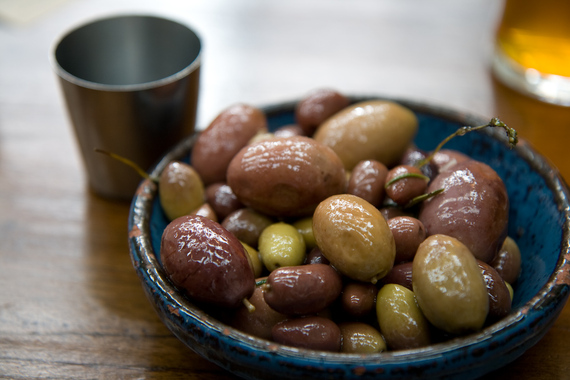I used to finish my plate, whether I was hungry or not. I never actually thought of it as a choice. I was brought up to finish my plate, and so I did.
Then a few years ago, I discovered intuitive eating, with its emphasis on listening to your body's hunger signals. With time and practice, I started listening to my body instead of allowing my plate to dictate how much I ate.
I found that there are at least three good reasons NOT to finish your plate.
1. You are full
This is the most important reason not to finish your plate. Our bodies are wise -- if we learn to listen to them. And one of the most important aspects of learning to listen to your body is to eat when you are hungry and stop when you are full. It sounds simple, but many times, we will not even stop to listen to satiety signals and will keep shoveling food into our mouths until we have the satisfaction of an empty plate.
What if, instead of honoring your plate, you honor your body?
Honoring your body means giving it as much food as it physically needs -- not more and not less. And if your body reaches the point of "Thank you, I've had enough now" while there is still food left on your plate, leave it there. This seemingly small act is actually a giant step towards creating a healthier relationship to your body -- and also reaching a healthy weight without diets or deprivation.
Not finishing your plate does not necessarily mean throwing away food. It can mean asking for a doggy bag, putting it back in the fridge to eat another time, starting a compost to "recycle" it or even freezing what's left for another meal.
2. You don't like the food
This sounds obvious, but if you don't like the food you are eating, then don't eat it! Even if you are at a restaurant or visiting friends or family, there is no point in forcing yourself to eat something out of politeness or fear of displeasing others.
This applies to healthy food too. Taking pleasure in what you eat has actually been shown to boost metabolism and increase nutrient absorption. So make sure you fully enjoy everything you eat -- or leave it on your plate.
When you are not really hungry or you don't feel like eating a certain food but you do so anyway just to avoid throwing it away, what message are you giving your poor body? Yes, you are treating your body like a garbage. I know this is a very difficult shift to make, especially if you were brought up with parents who refused to throw away food. Yet please consider -- is it REALLY better for anyone that you force yourself to eat something you don't want or need?
3. You know it doesn't do your body good
This one is a little more tricky: You enjoy the taste of the food, but you know it doesn't physically do your body good. For example, you order a dish at a restaurant that has fries and you actually like the taste. Yet you know that you always feel bad afterwards. So why not have a few fries that you fully savor, and leave the rest on your plate?
A good way to transition into this habit is to use smaller plates and serve yourself smaller portions. That way, you can stop before helping yourself to more and really ask your body whether it needs more food.
Giving your body, and not your plate the final say in how much you eat can radically shift your relationship to food and your body. I know it has for me. Why not give it a try?
www.healthwise.ch
hiba@healthwise.ch
Join Hiba on Facebook
Hiba Giacoletto is a psychologist and health coach passionate about helping people create healthier habits through mindfulness, intuition and pleasure. She uses a unique blend of nutrition and psychology to help her clients lose weight, take control of cravings or simply have a healthier relationship to food -- without diets or deprivation.
